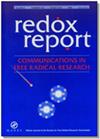SOD2 rs4880 and GPX1 rs1050450 polymorphisms do not confer risk of COVID-19, but influence inflammation or coagulation parameters in Serbian cohort
IF 5.2
2区 生物学
Q1 BIOCHEMISTRY & MOLECULAR BIOLOGY
引用次数: 10
Abstract
ABSTRACT Objectives: Due to the role of oxidative stress in the pathophysiology of COVID-19, it is biologically plausible that inter-individual differences in patients’ clinical manifestations might be affected by antioxidant genetic profile. The aim of our study was to assess the distribution of antioxidant genetic polymorphisms Nrf2 rs6721961, SOD2 rs4880, GPX1 rs1050450, GPX3 rs8177412, and GSTP1 (rs1695 and rs1138272) haplotype in COVID-19 patients and controls, with special emphasis on their association with laboratory biochemical parameters. Methods: The antioxidant genetic polymorphisms were assessed by appropriate PCR methods in 229 COVID-19 patients and 229 matched healthy individuals. Results: Among examined polymorphisms, only GSTP1 haplotype was associated with COVID-19 risk (p = 0.009). Polymorphisms of SOD2 and GPX1 influenced COVID-19 patients’ laboratory biochemical profile: SOD2*Val allele was associated with increased levels of fibrinogen (p = 0.040) and ferritin (p = 0.033), whereas GPX1*Leu allele was associated with D-dimmer (p = 0.009). Discussion: Our findings regarding the influence of SOD2 and GPX1 polymorphisms on inflammation and coagulation parameters might be of clinical importance. If confirmed in larger cohorts, these developments could provide a more personalized approach for better recognition of patients prone to thrombosis and those for the need of targeted antioxidant therapy.在塞尔维亚队列中,SOD2 rs4880和GPX1 rs1050450多态性不会增加COVID-19的风险,但会影响炎症或凝血参数
摘要目的:由于氧化应激在COVID-19病理生理中的作用,从生物学上讲,患者临床表现的个体差异可能受到抗氧化基因谱的影响。本研究的目的是评估抗氧化遗传多态性Nrf2 rs6721961、SOD2 rs4880、GPX1 rs1050450、GPX3 rs8177412和GSTP1 (rs1695和rs1138272)单倍型在COVID-19患者和对照组中的分布,并特别强调它们与实验室生化参数的相关性。方法:采用相应的PCR方法对229例新冠肺炎患者和229例匹配的健康个体的抗氧化基因多态性进行检测。结果:在所检测的多态性中,只有GSTP1单倍型与COVID-19风险相关(p = 0.009)。SOD2和GPX1的多态性影响COVID-19患者的实验室生化特征:SOD2*Val等位基因与纤维蛋白原(p = 0.040)和铁蛋白(p = 0.033)水平升高相关,GPX1*Leu等位基因与d -二聚体(p = 0.009)相关。讨论:我们关于SOD2和GPX1多态性对炎症和凝血参数的影响的研究结果可能具有临床意义。如果在更大的队列中得到证实,这些进展可以为更好地识别血栓易感性和需要靶向抗氧化治疗的患者提供更个性化的方法。
本文章由计算机程序翻译,如有差异,请以英文原文为准。
求助全文
约1分钟内获得全文
求助全文
来源期刊

Redox Report
生物-生化与分子生物学
CiteScore
6.10
自引率
0.00%
发文量
28
审稿时长
>12 weeks
期刊介绍:
Redox Report is a multidisciplinary peer-reviewed open access journal focusing on the role of free radicals, oxidative stress, activated oxygen, perioxidative and redox processes, primarily in the human environment and human pathology. Relevant papers on the animal and plant environment, biology and pathology will also be included.
While emphasis is placed upon methodological and intellectual advances underpinned by new data, the journal offers scope for review, hypotheses, critiques and other forms of discussion.
 求助内容:
求助内容: 应助结果提醒方式:
应助结果提醒方式:


